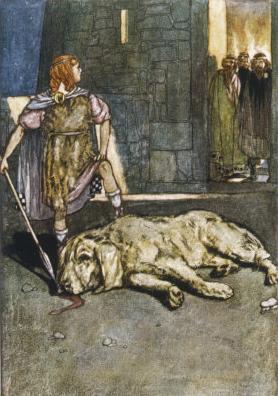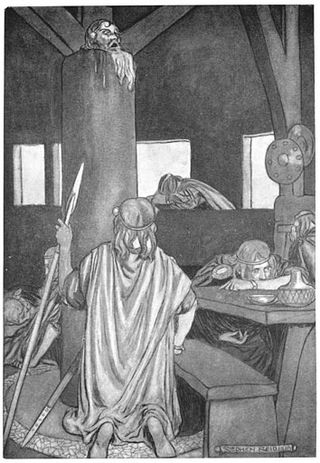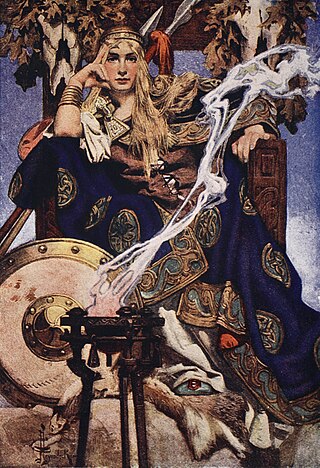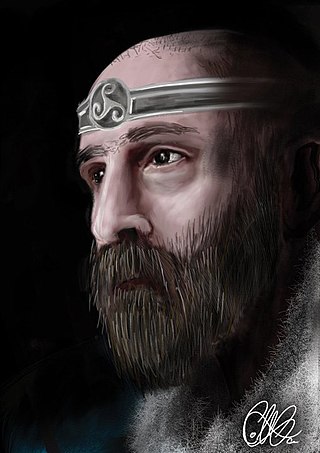Conall Cernach is a hero of the Ulaid in the Ulster Cycle of Irish mythology. He had a crooked neck and is said to have always slept with the head of a Connachtman under his knee. His epithet is normally translated as "victorious" or "triumphant", although it is an obscure word, and some texts struggle to explain it. Alternative meanings include "angular, having corners", "swollen", or "possessing a dish or receptacle". The original form of the name "Conall" in Ogham inscriptions was Cunavalas.

Deirdre is a tragic heroine in the Ulster Cycle of Irish mythology. She is also known by the epithet "Deirdre of the Sorrows".
Conchobarmac Nessa is the king of Ulster in the Ulster Cycle of Irish mythology. He rules from Emain Macha. He is usually said to be the son of the High King Fachtna Fáthach, although in some stories his father is the druid Cathbad, and he is usually known by his matronymic, mac Nessa: his mother is Ness, daughter of Eochaid Sálbuide, King of Ulster.

Cú Chulainn, is an Irish warrior hero and demigod in the Ulster Cycle of Irish mythology, as well as in Scottish and Manx folklore. He is believed to be an incarnation of the Irish god Lugh, who is also his father. His mother is the mortal Deichtine, sister of king Conchobar mac Nessa.

Súaltammac Róich is the mortal father of the hero Cúchulainn in the Ulster Cycle of Irish mythology. His wife is Deichtine, sister of Conchobar mac Nessa, king of Ulster. His brother is Fergus mac Róich.

In Irish mythology, Naisi, Noíse or Noisiu was the nephew of King Conchobar mac Nessa of Ulster, and a son of Uisneach. He is mentioned in the tale known as the Tragic Tale of the Sons of Uisnech, or Exiles of the Sons of Uisnech, usually found within the set of stories in the Táin Bó Cúailnge, part of the Ulster Cycle.

Medb, later spelled Meadhbh, Méabh(a) and Méibh, and often anglicised as Maeve, is queen of Connacht in the Ulster Cycle of Irish mythology. Her husband in the core stories of the cycle is Ailill mac Máta, although she had several husbands before him who were also kings of Connacht. She rules from Cruachan. She is the enemy of Conchobar mac Nessa, king of Ulster, and is best known for starting the Táin Bó Cúailnge to steal Ulster's prize stud bull Donn Cúailnge.

Ailill mac Máta is the king of the Connachta and the husband of queen Medb in the Ulster Cycle of Irish mythology. He rules from Cruachan.

Táin Bó Cúailnge, commonly known as The Táin or less commonly as The Cattle Raid of Cooley, is an epic from Irish mythology. It is often called "the Irish Iliad", although like most other early Irish literature, the Táin is written in prosimetrum, i.e. prose with periodic additions of verse composed by the characters. The Táin tells of a war against Ulster by Queen Medb of Connacht and her husband King Ailill, who intend to steal the stud bull Donn Cuailnge. Due to a curse upon the king and warriors of Ulster, the invaders are opposed only by the young demigod, Cú Chulainn.

Caladbolg is the sword of Fergus mac Róich from the Ulster Cycle of Irish mythology.

The Ulster Cycle, formerly known as the Red Branch Cycle, is a body of medieval Irish heroic legends and sagas of the Ulaid. It is set far in the past, in what is now eastern Ulster and northern Leinster, particularly counties Armagh, Down and Louth. It focuses on the mythical Ulster king Conchobar mac Nessa and his court at Emain Macha, the hero Cú Chulainn, and their conflict with the Connachta and queen Medb. The longest and most important tale is the epic Táin Bó Cúailnge. The Ulster Cycle is one of the four 'cycles' of Irish mythology and legend, along with the Mythological Cycle, the Fianna Cycle and the Kings' Cycle.
Bricriu is a hospitaller (briugu), troublemaker and poet in the Ulster Cycle of Irish mythology.
Eochu or Eochaid Feidlech, was a High King of Ireland, according to medieval Irish legends and historical traditions. He is best known as the father of the legendary queen Medb of Connacht.
Cormac Cond Longas was the eldest son of Conchobar mac Nessa by his own mother, Ness, in the Ulster Cycle of Irish mythology. His foster father was Fergus mac Róich.

In the Ulster Cycle of Irish mythology Donn Cúailnge, the Brown Bull of Cooley, was an extremely fertile stud bull over whom the Táin Bó Cúailnge was fought.
In the Ulster Cycle of Irish mythology, Dubthach Dóeltenga was a cynical ally of Fergus mac Róich who rarely had a good word to say about anyone. He accompanied Fergus to escort Deirdre and Naoise back to Ireland under the orders of Conchobar and later followed Fergus into exile in Connacht following Naoise's murder under Conchobar's orders. He was responsible for the death of Conchobar's son, among others. He later fought beside him in the Táin Bó Cuailnge, although at one point Fergus kicked him right out of the camp for his plans to kill Cú Chulainn.
Flidas or Flidais is a female figure in Irish Mythology, known by the epithet Foltchaín. She is believed to have been a goddess of cattle and fertility.
Luccreth moccu Chíara was a poet from County Kerry, Ireland who wrote in archaic Old Irish. Moccu is an archaic form marking affiliation to an ancestral population group or gens, in this case the Cíarraige. James Carney identifies the poet in genealogies of the Cíarraige as the last of six sons of a certain Áine, a descendant of Mug Airt, also known as Cíar, son of the legendary Ulaid hero Fergus mac Róich and supposed founder of the Cíarraige. The genealogies add that Luccreth had no children, and that "His dwelling-place faces the church of Cluain on the south".

Táin Bó Flidhais, also known as the Mayo Táin, is a tale from the Ulster Cycle of early Irish literature. It is one of a group of works known as Táin Bó, or "cattle raid" stories, the best known of which is Táin Bó Cúailnge. Táin Bó Flidhais survives in two forms, a short version from the Old Irish period and a longer version found in the 15th century Glenmasan manuscript, which is held in the Advocates Library in Edinburgh. It is believed to be a copy of an earlier manuscript from the 12th century. The early version of Táin Bó Flidhais predates the Táin Bó Cúailnge. It is named for the heroine of the tale, Flidais.









